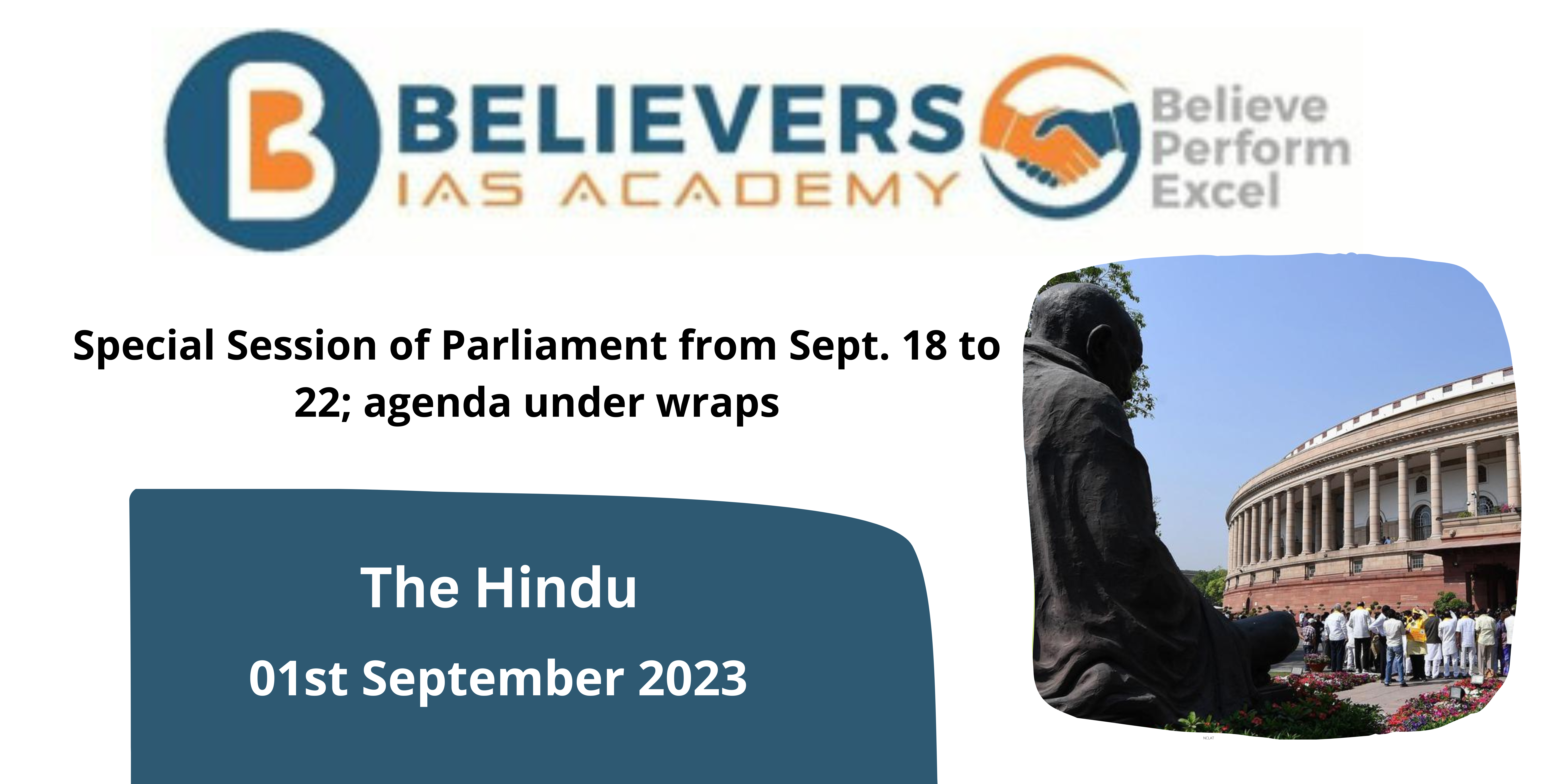Special Session of Parliament from Sept. 18 to 22; agenda under wraps
Context
Soon after the end of the G-20 Summit in this city on September 10, the Union administration on Thursday declared a Special Session of Parliament from September 18 to 22.
What is a Parliamentary session?
- A parliamentary session is the time frame between a house’s initial sitting and when it is prorogued. The session is when a legislature meets to pass laws.
- According to Article 85, the Houses of Parliament must be called together so that no more than six months pass between two sessions. Except for exceptional sessions, the Parliament typically meets three times every year.
- On the recommendation of the Council of Ministers, the President calls both regular and special sessions of Parliament. The President may, however, call a session of Parliament at his discretion if he believes that the six-month period may be coming to an end and the Union Council of Ministers has not requested it.
What are the different types of sessions being called in the Indian Parliament?
- Budget Session: The Indian Parliament’s longest and most important session is the budget session. It normally lasts through May and starts in late January or early February. The Budget Session’s salient characteristics are as follows:
- Presentation of the Union Budget: The session begins with a speech from the president to a joint session of both chambers of parliament. This session is dedicated to presenting and debating the Union Budget, which summarizes the government’s financial strategies for the upcoming fiscal year.
- Approval of the Budget: The budget’s different components, including taxes, spending, and government policies, are discussed and voted on by both houses of Parliament.
- Monsoon Season: Typically, the monsoon season lasts from July through September. The second-longest session of Parliament covers a range of legislative topics. The term “Monsoon Session” derives from the session’s scheduling, which falls during India’s monsoon season.
- Winter Session: From November through December, Parliament is in session. The legislative agenda takes up the majority of this session, which is the shortest of the three regular ones. Bills and other significant issues are discussed and passed during this session.
- Special Sessions: Outside of the regular sessions, Parliament may summon special sessions at any time to handle urgent matters. These meetings are held to talk about and consider issues that need to be resolved right away. On the recommendation of the Council of Ministers, the President decides whether to hold a special session.
How are the special sessions being conducted?
- Summoning the special session: The decision to call a special session is made by the President of India on the recommendation of the Council of Ministers, which is normally presided over by the Prime Minister. The choice is made depending on how urgent or significant the issues are that need to be resolved. The President officially calls a special session of Parliament into session and notifies lawmakers of the date and length of the meeting.
- Setting the agenda: The government establishes the agenda for the extraordinary session through the Ministry of Parliamentary Affairs. The exact bills, resolutions, or topics that will be discussed and debated during the session are included on this agenda. Both the Lok Sabha and the Rajya Sabha’s presiding officers are informed in advance of the agenda.
- Conduct of Business: During the special session, the Lok Sabha and the Rajya Sabha conduct business following their customary practices. This involves the introduction of bills, discussions about the problems listed on the agenda, debates, and voting on legislation. Both the Lok Sabha Speaker and the Rajya Sabha Chairman preside over their respective houses.
- Debates and Question Hour: Just like in ordinary sessions, Members of Parliament (MPs) have the opportunity to pose inquiries to the government during Question Hour. In addition, extraordinary sessions enable focused discussions on the pressing issues or circumstances that prompted the session. MPs get the chance to discuss the topics, share information, and express their opinions.
- Legislative Process: If there are any bills or resolutions on the agenda, they go through the voting, committee examination, and repeated readings that make up the legislative process. Legislation is still passed using the same procedure as in ordinary sessions.
- Adjournment: Daily sittings of both houses during the special session may be adjourned as with ordinary sessions, with particular dates and times designated for their reconvening. The adjournment gives time for more thought and allows for breaks between sittings.
- Conclusion: When all items on the agenda have been addressed or the time allotted for the session has passed, as stipulated by the President in the summoning notification, the special session is over. The President may prorogue (officially adjourn) the session following its conclusion.




